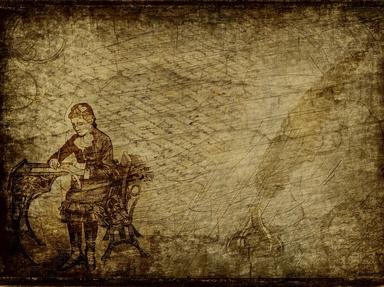Quiz Answer Key and Fun Facts
1. Langston Hughes was known as a leader of what artistic movement, which he referred to as the time when "the negro was in vogue"?
2. What was the title of Langston Hughes's first collection of poetry?
3. "Hold fast to ______ / For if _____ die / Life is a broken-winged bird / That cannot fly." What word is missing from these lines?
4. "I, too, sing ____" what?
5. What is the title of the Langston Hughes poem that contains the lines "So boy, don't you turn back. / Don't you set down on the steps / 'Cause you finds it's kinder hard"?
6. "Life for me ain't been no ______ stair." What kind of stair?
7. When the woman in "50-50" complains she "ain't got no man," what does "Big Boy" tell her she must do? "Share your bed and your _____"
8. Although best known for his poetry, Langston Hughes also wrote musical plays. Which of his plays retells the story of Christ's birth using an all-black cast?
9. Which of the following is a collection of short stories by Langston Hughes?
10. "Clean the _____, boy," the narrator of one poem is told. What does the narrator receive "a nickel, a dime, a dollar, two dollars a day" for cleaning?
11. In "Cross", the narrator's white father "died in a fine big house." Where did his black mother die?
12. When the narrator of a Langston Hughes poem gets "to be a colored composer," he's going to write some music about daybreak in what state?
13. "Good morning, daddy! / Ain't you heard / The boogie-woogie rumble / Of a dream _____?" What kind of dream?
14. Did Langston Hughes ever write a novel?
15. Langston Hughes wrote several books for children, including one about what African-American singer of classical music and spirituals?
16. "Freedom will not come / Today, this year / Nor ever" through what?
17. "_____ never was ______ to me." What word is missing from this blank?
18. "I've known _____ ancient as the world and older than the flow of human blood in human veins." What has the poet known?
19. For which class does the poet write a paper that says, "As I learn from you, / I guess you learn from me - / although you're older - and white - / and somewhat more free"?
20. What play by Lorraine Hansberry, which debuted in 1959, takes it title from a line in the Langston Hughes poem "Harlem"?
21. What Langston Hughes poem, originally published as a two-page spread, contains a section titled "Listen Hungry Ones!" and satirizes economic inequality in the 1930s?
22. "The night is beautiful, / So the faces of _____" what?
23. Which of the following does Langston Hughes NOT mention in his poem about "loud laughers in the hands of Fate"?
24. What Langston Hughes poem begins, "I am your son, white man!"
25. Langston Hughes is considered an early innovator of what form of poetry?
Source: Author
skylarb
This quiz was reviewed by FunTrivia editor
looney_tunes before going online.
Any errors found in FunTrivia content are routinely corrected through our feedback system.

